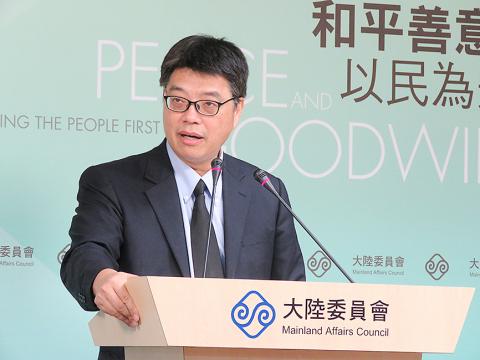The Mainland Affairs Council (MAC) yesterday warned Taiwanese living in China of a potential risk of government surveillance, after Beijing announced that it would allow people from Taiwan, Hong Kong and Macau to apply for residence permits starting on Sept. 1.
Taiwanese, Hong Kongers and Macanese who have lived in China for more than six months and are legally working, living or studying in the country would have the option of applying for a residence permit, the Chinese State Council Information Office announced at a news conference in Beijing yesterday.
They would be able to receive the permit 20 business days after submitting an application by taking a valid travel permit to their local public security agency, Chinese Deputy Minister of Public Security Shi Jun (侍俊) said.

Photo: CNA
Taiwanese do not need to have permanent resident status in China or give up their permanent resident status in Taiwan to apply for the permit, China’s Taiwan Affairs Office Deputy Director Long Mingbiao (龍明彪) said.
The rights and obligations they have in Taiwan would not be affected, he said.
The residence permit would be used to prove the identities of Taiwanese, Hong Kongers and Macanese in China, Long said.
It would adopt the same technical standards used in the production of Chinese resident identity cards and use an 18-digit identification number to ensure compatibility with all identification card readers in the Chinese public service system, he said.
The resident permit cannot be used to enter or exit China, Long said, adding that the Mainland Travel Permit for Taiwan Residents is the only travel document Taiwanese can use to enter or exit China.
MAC Deputy Minister and spokesperson Chiu Chui-cheng (邱垂正) called the move a part of China’s “united front” strategy of giving Taiwanese equal treatment to Chinese citizens.
Along with 31 measures for Taiwanese hoping to work or study in China, the equal treatment Beijing gives Taiwanese residents and Chinese citizens in some provinces and cities is part of China’s “united front” tactics, he said.
China currently issues temporary residence permits to Taiwanese living in China, he added.
The council would look into the difference between the temporary residence permit and the residence permit, as well as whether there is a substantial difference between obtaining the residence permit and registering a household in China after the details of the regulations are announced, Chiu said.
Over the past few years, Beijing has been creating its “Skynet Project,” which uses surveillance cameras to monitor the movements of people and vehicles, he said.
Through the surveillance system, Beijing might already possess the facial recognition records of more than 1 billion people, he added.
As soon as it identifies someone who has challenged social order, the system activates its surveillance and tracking devices, and uses automatic facial recognition technology to record the incident, Chiu said, adding that the system also incorporates a social credit system to monitor the public.
Taiwanese who wish to work or study in China should beware of the potential risks involved with obtaining a residence permit, he said.
The council believes that Taiwanese studying or working in China all cherish the experience of growing up in Taiwan’s democratic and free environment, and that China’s “united front” strategy of issuing resident permits would not affect their love and sense of identity toward Taiwan, he added.

A preclearance service to facilitate entry for people traveling to select airports in Japan would be available from Thursday next week to Feb. 25 at Taiwan Taoyuan International Airport, Taoyuan International Airport Corp (TIAC) said on Tuesday. The service was first made available to Taiwanese travelers throughout the winter vacation of 2024 and during the Lunar New Year holiday. In addition to flights to the Japanese cities of Hakodate, Asahikawa, Akita, Sendai, Niigata, Okayama, Takamatsu, Kumamoto and Kagoshima, the service would be available to travelers to Kobe and Oita. The service can be accessed by passengers of 15 flight routes operated by

Alain Robert, known as the "French Spider-Man," praised Alex Honnold as exceptionally well-prepared after the US climber completed a free solo ascent of Taipei 101 yesterday. Robert said Honnold's ascent of the 508m-tall skyscraper in just more than one-and-a-half hours without using safety ropes or equipment was a remarkable achievement. "This is my life," he said in an interview conducted in French, adding that he liked the feeling of being "on the edge of danger." The 63-year-old Frenchman climbed Taipei 101 using ropes in December 2004, taking about four hours to reach the top. On a one-to-10 scale of difficulty, Robert said Taipei 101

Taiwanese and US defense groups are collaborating to introduce deployable, semi-autonomous manufacturing systems for drones and components in a boost to the nation’s supply chain resilience. Taiwan’s G-Tech Optroelectronics Corp subsidiary GTOC and the US’ Aerkomm Inc on Friday announced an agreement with fellow US-based Firestorm Lab to adopt the latter’s xCell, a technology featuring 3D printers fitted in 6.1m container units. The systems enable aerial platforms and parts to be produced in high volumes from dispersed nodes capable of rapid redeployment, to minimize the risk of enemy strikes and to meet field requirements, they said. Firestorm chief technology officer Ian Muceus said

MORE FALL: An investigation into one of Xi’s key cronies, part of a broader ‘anti-corruption’ drive, indicates that he might have a deep distrust in the military, an expert said China’s latest military purge underscores systemic risks in its shift from collective leadership to sole rule under Chinese President Xi Jinping (習近平), and could disrupt its chain of command and military capabilities, a national security official said yesterday. If decisionmaking within the Chinese Communist Party has become “irrational” under one-man rule, the Taiwan Strait and the regional situation must be approached with extreme caution, given unforeseen risks, they added. The anonymous official made the remarks as China’s Central Military Commission Vice Chairman Zhang Youxia (張又俠) and Joint Staff Department Chief of Staff Liu Zhenli (劉振立) were reportedly being investigated for suspected “serious